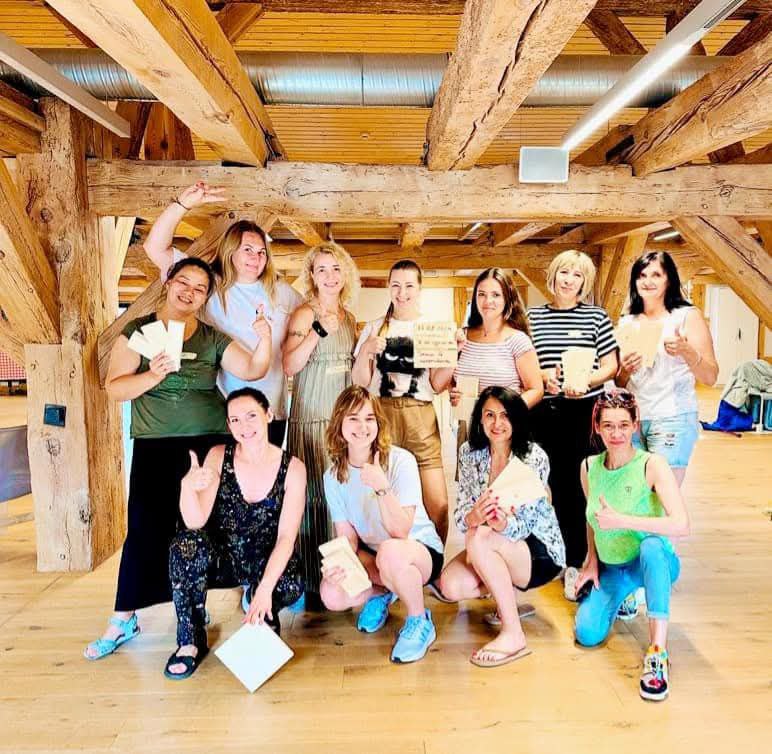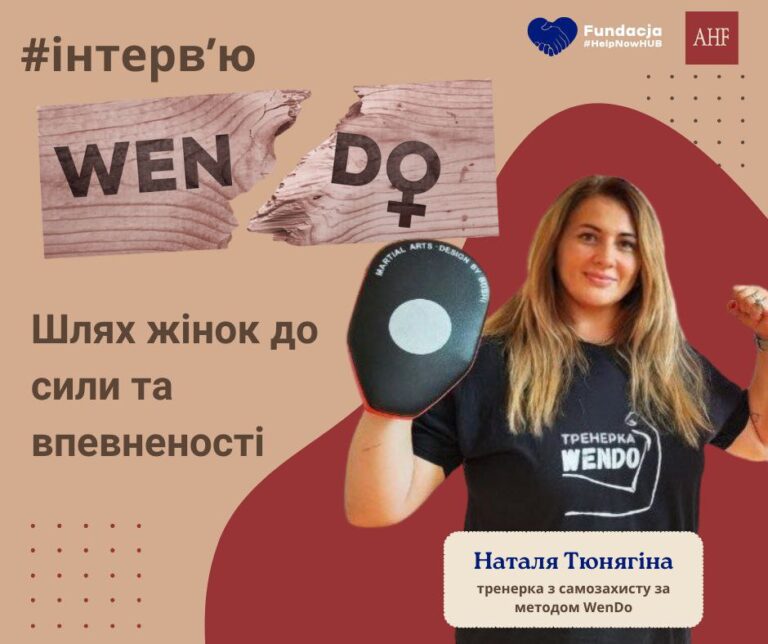In a world where women and girls face various forms of violence every day — from hidden manipulation to open aggression — methods that help them feel strong, confident, and protected become especially important. WenDo, which translates as “The Women’s Path,” is not just a self-defense course. It is a holistic approach that combines physical techniques, the development of assertiveness, and awareness of personal boundaries. Trainings create a safe space where participants can not only gain practical skills but also cultivate inner strength, learn to use their voice, body language, and the right to say “no” as tools of self-defense.
This year, a series of WenDo trainings will take place as part of the social project We Are Different – We Are Equal!, implemented by Fundacja HelpNow HUB with the financial support of AIDS Healthcare Foundation (AHF). The initiative is aimed at supporting migrant women and women from vulnerable groups in Poland, who especially need resources to resist gender-based violence.
We spoke with Natalia Tyunyagina — board member of Fundacja HelpNow HUB, activist, trainer, and graduate of the WenDo Academy — about her own path in WenDo, the transformation this method brings, and how it differs from classical self-defense courses.
Natalia, you were a student of the WenDo Academy, and now you are a certified trainer. How did you first learn about WenDo and what attracted you to this method?
— Back in 2022, I first saw an announcement about admission to the third WenDo Academy. It was the first Academy for Ukrainian activists. At that time, I was afraid to apply because, when reading the program, I feared I wouldn’t manage, that I wasn’t “enough.” I was also intimidated by the duration of the training — almost a year.
Just a few months later, at a community event, I met a young woman who shared her experience of attending WenDo trainings. She spoke about how radically her life and her perception of herself as a woman had changed. She said it with such passion that I realized: WenDo is a tool for everyday life — from conflicts on public transport to resisting bullying or domestic violence. That’s when I also became determined to attend such a training.
From that time on, WenDo seemed to be everywhere: in social media, in conversations with women who had taken part. And in 2023, it turned out that one of the participants of the third Academy was an old acquaintance of mine. She offered to hold her diploma training in Hajnówka, the small town where I now live. Of course, I agreed. My task was to gather women and find a space.
After attending the two-day, 12-hour training, I finally understood: I’m going to the fourth Trainers’ Academy. I applied and was accepted.
Has your sense of personal boundaries changed after completing the WenDo Academy?
— Yes, very much. I learned to more clearly define where my psychological, emotional, and physical boundaries lie, and to defend them with confidence. Now I better understand what is acceptable for me and what is a violation of my safety or comfort.
Before, I might have agreed to something “just to avoid conflict,” but WenDo taught me to say “no” without fear or shame. If someone ignores my boundaries (unwanted touch, manipulation), I no longer withdraw — I act: I loudly express my refusal or use physical techniques if the threat is real.
WenDo gave me not only knowledge but also confidence that my boundaries are my right, and defending them is normal.
WenDo is called “The Women’s Path.” How would you explain this name in your own words?
— WenDo is The Women’s Path because it doesn’t just teach self-defense — it helps you feel the inner strength that already exists within each of us. It’s more than techniques — it’s a philosophy that teaches you to respect yourself, boldly define your boundaries, and not be afraid to protect them, uniting mind, body, and emotions.
WenDo is about stopping being “convenient” and starting to be free. There is no place here for the role of a victim — only dignity, self-respect, and the ability to stand up for yourself, not only physically but also through the conscious choice to be untouchable.
How does WenDo differ from classical self-defense courses?
— WenDo is not just a set of physical techniques but a holistic system of women’s protection. It combines psychological preparation, violence prevention, and physical techniques adapted to women’s physiology and social experience.
Unlike traditional trainings, where the main focus is the strike technique, WenDo teaches how to anticipate danger, confidently say “no,” and use voice and body language to prevent conflict. Physical force is applied only in extreme cases. WenDo reveals women’s inner strength rather than just “training fists.”
How do you create a safe space where participants can share personal experiences?
— First of all, through clear rules of mutual respect: anonymity (if desired), prohibition of judgment, criticism, or unsolicited advice, and the principle of “stop” (any participant can stop the process if a topic is too painful for her).
We, the trainers, start by sharing our own stories to ease the atmosphere. All exercises are conducted in the format “we invite, not force” — the choice is always with the participant. It is also important that the space is physically secure: closed doors, phones set aside, and the venue chosen as neutral and safe.
Which exercises or techniques usually spark the greatest interest or emotional response?
— One of the most emotionally powerful exercises in WenDo is practicing a loud “NO.” Participants learn to shout it at full strength, often for the first time in their lives — without apologizing. This brings tears, laughter, and, most importantly, the realization that they can be loud, “inconvenient,” and still safe.
Equally impactful are role-playing exercises of defending boundaries: refusing a pushy colleague or responding to a toxic remark from relatives. This is not only about the technical response but also about the physical feeling of their own strength. Women often say afterward: “I finally felt that my boundaries are not just words but something real that I can defend with my body and voice.”
We intentionally create a “safe explosion effect”: participants can experiment with aggressive gestures or sharp tones without fear of judgment, so that later in life they can consciously use these skills.
Do participants ever share stories after the training about situations where they applied WenDo knowledge?
— Yes, and that’s very valuable. One woman shared how a stranger tried to press against her in a crowd. Instead of “shrinking away,” she stopped him with a sharp look (as we practiced in training) and a loud “Step back!” The attacker retreated, and she realized his power had been in her silence.
Another participant, who always stayed silent during arguments with her husband, for the first time said: “I won’t discuss this until you calm down.” He was stunned, and she felt she controlled the situation.
These are not “heroic” stories but everyday applications of WenDo — and that’s exactly what it was created for.
How does WenDo help overcome inner barriers such as shame or fear?
— Through the physical experience of one’s own strength. When a woman first shouts “NO!” loudly, escapes a hold, or practices a strike, she literally feels she has the right to protect herself. This rewrites psychological blocks.
Fear and shame fade because the body remembers: “I can respond,” and the mind understands: “My safety is not selfishness, it’s normal.”
As trainers, we create success situations. For example, a participant who used to stay silent can, in the safe conditions of training, for the first time stand up for her boundaries. This contrast becomes a real breakthrough.
Within the project We Are Different – We Are Equal!, funded by AIDS Healthcare Foundation, five WenDo trainings are planned. Where will they take place and how can one apply?
— This project is special for us because the trainings will be held for migrant women and women from vulnerable groups who face an increased risk of gender-based and domestic violence. Due to language barriers, social isolation, or unstable legal status, many of them remain unprotected. As trainers, we want to teach them not only physical defense but also strategies against manipulation, boundary-setting, and seeking help.
The trainings are planned to start in mid-September in Warsaw, Bydgoszcz, and Białystok. Specific dates and venues will be announced on our social media page. To apply, you’ll need to fill out a Google form via a link (to be shared soon). Participation is free.
This material was prepared within the framework of the social project We Are Different – We Are Equal!, implemented by Fundacja HelpNow HUB with the support of AIDS Healthcare Foundation (AHF).


